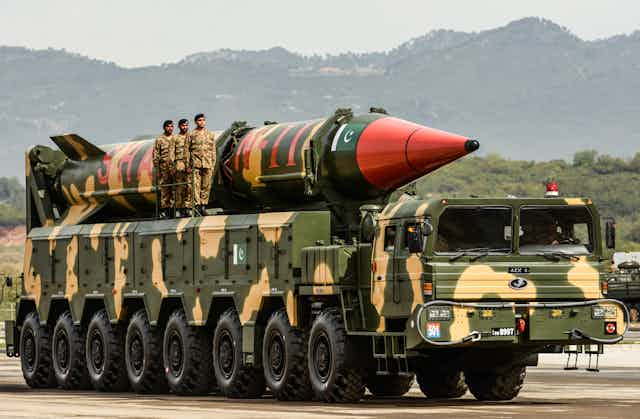The heavily freighted idea of an “Islamic bomb” has been around for some decades now. The notion behind it is that a nuclear weapon developed by an “Islamic” nation would automatically become the Islamic world’s shared property – and more than that, a “nuclear sword” with which to wage jihad. But as with many terms applied to the “Islamic world”, it says more about Western attitudes than about why and how nuclear technology has spread.
The concept as we know it emerged from anxieties about proliferation, globalisation, resurgent Islam, and conspiracies real and imagined, a fearful idea that could be applied to the atomic ambitions of any Muslim nation or non-state group. It looked at Pakistan’s nuclear programme and extrapolated it to encompass everything between the mountains of South Asia and the deserts of North Africa. And ever since it appeared it has retained its power to shock, eliding terrorism, jihadism, the perceived ambitions of “Islamic” states, and state-private proliferation networks into one fearsome term.
It has also made a useful avatar for all sorts of specific threats – Muammar Gaddafi’s anti-Western “fanaticism”, Saddam Hussein’s socialist Ba’athism, the Iranian Mullahs’ revolutionary Islamic ideology, contemporary fundamentalist terrorism, and Pakistan’s military-Islamic thinking.
But of course, the Islamic bomb idea is part of a web of complex geopolitical ideas. International terrorism, the rise of modern political Islam, and Western interventions all muddle the issue. And oddly enough given the way it’s used today, the term in fact began its strange life outside the West.
High hopes
The connection between religion and the bomb was in fact first explicitly made in 1970s Pakistan, where leaders Zulfikar Ali Bhutto and Muhammad Zia ul-Haq both saw nuclear weapons as a means to enhance the country’s status within the so-called “Muslim world”. Yet Pakistan’s atomic programme was at its heart a nationalistic security project, not a religious one.
The term “Islamic bomb” didn’t appear in the Western news media until around 1979, when the Iranian Revolution set outsiders worrying about the potential intersections between nuclear weapons, proliferation and Islamic politics. At around the same time, India was mounting a campaign against Pakistan’s nuclear ambitions; its government and media duly began deliberately stoking fears of a pan-Islamic nuclear threat originating with Islamabad. Israel’s government, too, made it clear that it believed an Islamic bomb was imminent.

Media revelations about Pakistani metallurgist Abdul Qadeer Khan also helped to spur interest. In 1975, Khan had stolen uranium enrichment centrifuge blueprints from the URENCO plant in the Netherlands. These ended up providing the technical basis for Pakistan’s bomb programme.
Khan’s theft – and the genuine conspiracy that was Pakistan’s international nuclear purchasing project – led to conspiracy theories. Despite being a Pakistani nationalist, the Guardian newspaper stated that “Dr Khan Stole the Bomb for Islam”. His act was seen not as the actions of one man, but as part of a wider “Islamic” conspiracy.
In 1979, media institutions including West Germany’s ZDF, the UK’s BBC, and the US’s CBS all popularised the concept. On little evidence, it became accepted that this was a project designed to benefit the entire Muslim world. But despite the genuine Pakistani-Libyan connections, there was simply never a unified Islamic nuclear quest.
Conspiracy theory
Through the 1980s and 1990s, countries as diverse and mutually antagonistic as Iran, Iraq, Libya, Niger and Pakistan were all tied together by the Western fear of an Islamic bomb. Prominent commentators such as Jack Anderson and William Safire consistently deployed the term; politicians as diverse as Tam Dalyell, Edward Kennedy, and Daniel Patrick Moynihan all talked about it in fearful terms. All were off-base.
After Khan’s international proliferation network was exposed in 2004, there duly appeared a slew of books on the subject, more than a few of which posited that there was an international “Islamic” conspiracy to acquire “the bomb”. Khan was portrayed as a “nuclear jihadist” bent on righting perceived wrongs inflicted by the West on the world’s Muslims.
Again, a genuine conspiracy became tied up with conspiracy theory. Yes, Khan did proliferate centrifuge technology to Iran, Libya and North Korea – but he was motivated by money, power and prestige, not religion.

Today, the spectre of the Islamic bomb haunts certain corners of the internet. From the Huffington Post to Breitbart and the Washington Times, the term crops up again and again, always used to imply that nations such as Iran harbour ambitious ideological motives for their nuclear ambitions.
It’s true that prominent Muslim figures from Bhutto to bin Laden spoke rhetorically about a “bomb for the ummah”. But this was never more than rhetoric. Leaving aside all nuclear matters, internecine and sectarian differences and conflict mean that global Islamic political unity is unlikely in the extreme.
The Islamic bomb has always been a convenient device with which to elide complex problems of religion, politics and nuclear weapons. And sadly, it still is. Those who still casually bandy the term about would do well to think about where it really comes from.

